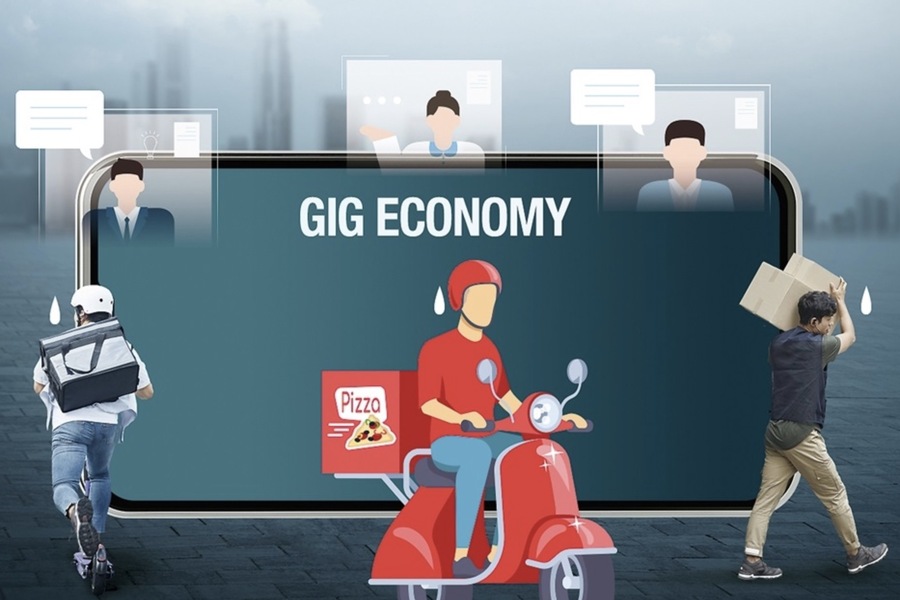As Dubai’s workforce continues to evolve, the rise of the gig economy has played a pivotal role in reshaping the financial needs of freelancers, part-time workers, and independent contractors. Mobile banking apps, specifically tailored to the UAE market, are stepping in to address these unique demands by offering seamless financial solutions. This article explores how mobile banking apps are supporting Dubai’s gig economy and the ways they have become indispensable tools for managing income, payments, and overall financial well-being.
Understanding Dubai’s Gig Economy
Dubai’s gig economy has grown substantially, driven by a combination of government policies, technological advancements, and an entrepreneurial spirit. According to the World Economic Forum, 75% of large companies in the UAE plan to hire more freelancers in the coming years. Freelancers in sectors such as tech, marketing, and delivery services now contribute significantly to Dubai’s economy. This shift has created a demand for flexible banking solutions that cater to the diverse and non-traditional income streams that gig workers manage.
Flexible Account Management and Financial Tracking
One of the core ways mobile banking apps assist gig workers is by offering flexible account management. Traditional banking services often fall short in accommodating fluctuating incomes and multiple payment sources. Mobile banking apps, however, provide real-time updates, allowing users to track payments, transfers, and expenses easily. Gig workers can view detailed breakdowns of their income and set up personalized notifications for incoming payments.
Many apps also offer integrated budgeting tools, which help freelancers in Dubai track variable earnings and plan for irregular expenses. This flexibility ensures that gig workers remain in control of their finances, regardless of income variability.

Easy Payment Solutions for Gig Workers
One of the greatest challenges for freelancers is managing payment collection. Unlike salaried employees, gig workers often deal with multiple clients, varied payment schedules, and cross-border transactions. Mobile banking apps streamline this process by providing simple, fast, and reliable payment solutions. Gig workers can easily receive payments through mobile wallets, direct transfers, and even digital currencies, depending on the platform used.
In Dubai, many mobile banking apps also offer payment integration with international platforms like PayPal and Stripe, ensuring that gig workers can access their earnings globally. This ease of payment processing ensures freelancers maintain liquidity and avoid delays, which can significantly impact their financial stability.
Digital Wallets and Contactless Payments
With the rise of digital wallets and contactless payment solutions, mobile banking apps are becoming crucial in Dubai’s move toward a cashless economy. For gig workers who rely on microtransactions, such as delivery drivers and freelance consultants, the ability to process small payments quickly and efficiently is essential. Mobile banking apps like Liv Digital Bank offer integrated digital wallets, allowing users to pay for services, receive payments, and transfer funds seamlessly.
This feature also supports gig workers by eliminating the need for traditional banking infrastructure, offering a convenient, mobile-first financial ecosystem. Moreover, contactless payments make day-to-day transactions faster, benefiting gig workers who need to process payments on the go.
Access to Microloans and Credit
Another significant challenge that gig workers face is access to credit. Traditional banking institutions often require a consistent salary and employment history to qualify for loans, leaving freelancers at a disadvantage. However, mobile banking apps in Dubai are breaking this barrier by offering microloans and short-term credit options specifically tailored for gig workers.
Some apps assess creditworthiness based on transaction history, financial behavior, and income patterns rather than formal employment. This allows gig workers to access small loans when they need them, helping them manage cash flow and cover unexpected expenses. Such financial tools empower freelancers by providing the necessary support without requiring a traditional employment structure.
Savings and Investment Options for Freelancers
While managing day-to-day finances is essential, saving and investing are equally important for gig workers who don’t benefit from employer-provided retirement plans. Mobile banking apps in Dubai have begun offering savings and investment solutions geared toward freelancers. Automated savings tools, round-up options, and low-risk investment portfolios are now accessible directly through banking apps.
By offering these features, mobile banking apps encourage gig workers to take control of their financial future, enabling them to build wealth gradually. With easy access to diversified financial products, freelancers in Dubai can establish long-term financial security, even without a traditional retirement plan in place.
Tax Management and Financial Reporting
Navigating tax obligations is another complex area for freelancers. Unlike full-time employees, gig workers need to manage their taxes independently, including reporting income from multiple sources and handling tax deductions. Mobile banking apps have responded by offering features that help freelancers manage their taxes efficiently.
For instance, many apps provide expense categorization tools, allowing users to track business-related expenses automatically. Some apps also integrate with tax reporting software, simplifying the tax filing process for freelancers in Dubai. This functionality is particularly valuable given Dubai’s growing emphasis on regulatory compliance, ensuring that gig workers can handle tax-related tasks without needing third-party assistance.

Enhancing Financial Literacy for the Gig Economy
As the gig economy continues to grow, so does the need for financial literacy among freelancers. Mobile banking apps are playing a crucial role in this regard by offering educational content, financial advice, and interactive tools that improve users’ financial knowledge. Freelancers can access tutorials on budgeting, saving, investing, and managing debt directly from their banking apps.
Additionally, some mobile banking platforms offer personalized financial coaching, ensuring gig workers receive tailored advice based on their specific financial situation. This feature empowers freelancers to make informed decisions about their finances, ensuring long-term sustainability and growth within the gig economy.
Liv Digital Bank: A Key Player in Supporting Gig Workers
Among the many mobile banking solutions available in Dubai, Liv Digital Bank stands out for its targeted support for freelancers and gig workers. The app is designed with a mobile-first approach, offering gig workers flexible account management, payment solutions, and financial insights in one platform. By focusing on the unique needs of Dubai’s gig economy, Liv Digital Bank helps freelancers navigate their financial challenges with ease, contributing to the growing financial inclusion of non-traditional workers in the region.
Conclusion
Mobile banking apps have become an essential tool for supporting Dubai’s gig economy, providing flexible, tailored solutions that address the unique challenges faced by freelancers and independent contractors. From easy payment processing and microloans to savings, investment options, and tax management, these apps offer a comprehensive financial ecosystem for gig workers. As Dubai’s workforce continues to shift toward freelancing and flexible employment, mobile banking platforms will play an increasingly significant role in shaping the future of the city’s economy.

Biker, hustler, fender owner, reclaimed wood collector and critical graphic designer. Performing at the crossroads of minimalism and computer science to save the world from bad design. I prefer clear logic to decoration.



